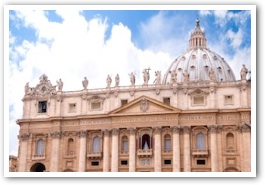
Posted on 01/04/2015 3:05:12 AM PST by NYer
Freedom of speech is a great thing. Unfortunately, it comes at an unavoidable price: When citizens are free to say what they want, theyll sometimes use that freedom to say some pretty silly things. And thats the case with the 12 claims were about to cover.
 |
Some of them are made over and over, others are rare. Either way, while the proponents of these errors are free to promote them, we as Catholics have a duty to respond.
1. "There's no such thing as absolute truth. What's true for you may not be true for me."
People use this argument a lot when they disagree with a statement and have no other way to support their idea. After all, if nothing is true for everyone, then they can believe whatever they want and there's nothing you can say to make them change their minds.
But look at that statement again: "There's no such thing as absolute truth." Isn't that, in itself, a statement that's being made absolutely? In other words, it applies some rule or standard to everyone across the board — exactly what the relativists say is impossible. They have undone their own argument simply by stating their case.
The other problem with this statement is that no relativist actually believes it. If someone said to you, "There is no absolute truth," and you punched him in the stomach, he'd probably get upset. But by his own creed, he'd have to accept that while punching someone in the stomach may be wrong for him, it might not be wrong for you.
This is when they'll come back with an amendment to the original statement by saying, "As long as you're not hurting others, you're free to do and believe what you like." But this is an arbitrary distinction (as well as another absolute statement). Who says I can't hurt others? What constitutes "hurt"? Where does this rule come from?
If this statement is made based on personal preference, it means nothing for anyone else. "Do no harm" is in itself an appeal to something greater — a sort of universal dignity for the human person. But again, the question is where does this dignity come from?
As you can see, the further you delve into these questions, the closer you come to understanding that our concepts of right and truth are not arbitrary but are based in some greater, universal truth outside ourselves — a truth written in the very nature of our being. We may not know it in its entirety, but it can't be denied that this truth exists.
Ping!
Fascinating article and apros to regular Baptists, as well....
It is one thing to oppose a shibboleth like, "As long as you're not hurting others, you're free to do and believe what you like" and quite another to regulate conduct prohibiting people from doing as they like when they in fact do not hurt others. Equally, it is hardly philosophically defensible to prohibit sentinent adults from conduct which hurts only themselves. To extend the principle even further, it's is even wrong to prohibit people from doing as they like when the harm to others is less than the harm caused by the enforcement of the prohibition-a situation we have seen in our own country and under the same name.
The point, context is all and there is no warrant granted either to the left to endlessly regulate conduct for their ends as there is no warrant granted to the right, Christian or otherwise, to regulate conduct to achieve their spiritual goals by force of law.
There is a very good reason why we have a First Amendment and that amendment has two sides to it.
Is a very dangerous path which sounds good when a Christian hears familiar refrains to transform them into law but it clangs rudely against our sensitivities when the impetus is to impose sharia. Arguments adduced to impose Christian conduct upon society by the force of law can be equally maintained to impose sharia-unless some value apart from divine word becomes part of the context.


This is a 100% truism for practicing Roman Catholics. Don’t claim you are a practicing Catholic on your own terms. There are rules.
I do not pretend. I am a lapsed Catholic since HS with 2 brief excursions back. I do not receive the sacraments when I do attend Mass. I respect the rules and will not defile them to put on a little show for my neighbors in the pews. I know lots of folks do.
Summary: “Everyone is making truth claims based on some authority - even those who claim they aren’t.”
Your comment: “It is one thing to repair to a private chapel and worship an ultimate truth and quite another thing to go into the legislature and make laws to impose your ultimate truth on another citizen.”
Yes God allows us free will and does not force us to follow his rules. However, there are consequences both in civil society and on the Judgement Day.
Society has the right to establish rules based on Truth such as the Ten Commandments and what is right and just. However, they also have the power to establish unjust laws that is opposed to the Truth.
I may say that I believe in absolute truth, but do I? or do I just believe in my perception of it.
Most believers can agree on, or at least not dare to disagree on many plain and to the point scripture such as the first , sixth, seventh and eighth commandments, but there are much disagreement about the fourth commandment and the other ones are hardly mentioned.
I believe we can ignore any thing an atheist may say so while there is an absolute truth a Christian`s concern should be just what is the truth on any given subject in scripture?
Moral absolutes ping!
What you SAY is less important than what you do. My opinion only.
What you SAY is less important than what you do. My opinion only.
This is the essence of post-post-modernism, that the rejection of absolutes is itself an absolute.
But isn’t it a legitimate role of law to codify and enforce morality? And if that morality is shaped by religious tenet, then how can it — and the laws deriving therefrom — be divorced from the religion?
Agree.
There’s a reason that the only direct quote from Pilate is “What IS truth?”
There’s a reason that the only direct quote from Pilate is “What IS truth?”
Christ is truth. Do you believe that?
If there IS an ultimate truth, then society is obligated to enforce it by encouragement and, if necessary, by law.
If there is NOT an ultimate truth, then what standard do you propose to enforce anything upon society? Because all law is based upon morality, and morality is based upon the ultimate truth.
I also would suggest that the First Amendment is not what you think it is. It has to do with the establishment of religion as state-supported - and look at all the havoc that has wreaked in German, corrupting all the bishops in their lust for the Church Tax.
Sectarianism is probably not going to be supported by any legislative body, but something along the lines of C.S. Lewis' "Mere Christianity" is not only permissible but a very good idea. It's interesting and informative that in the back of the book he has listed examples from all over the world of what he calls "the Tao": the agreed-upon moral rules that come to their fruition in Christianity.
Sharia law doesn't enter into this not because religious belief should not inform legislation, but because sharia and the religion that espouses it is WRONG. Objectively wrong.
That is far from the only statement of Pilate recorded in the Gospels.
The 23rd chapter of Luke records numerous quotations, and others found in other Gospels.
Disclaimer: Opinions posted on Free Republic are those of the individual posters and do not necessarily represent the opinion of Free Republic or its management. All materials posted herein are protected by copyright law and the exemption for fair use of copyrighted works.